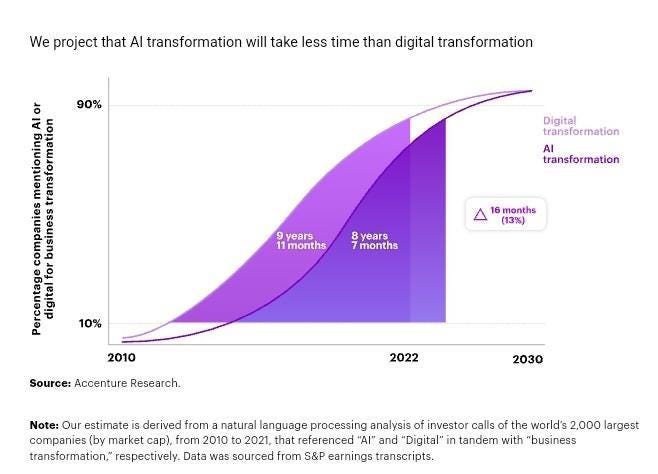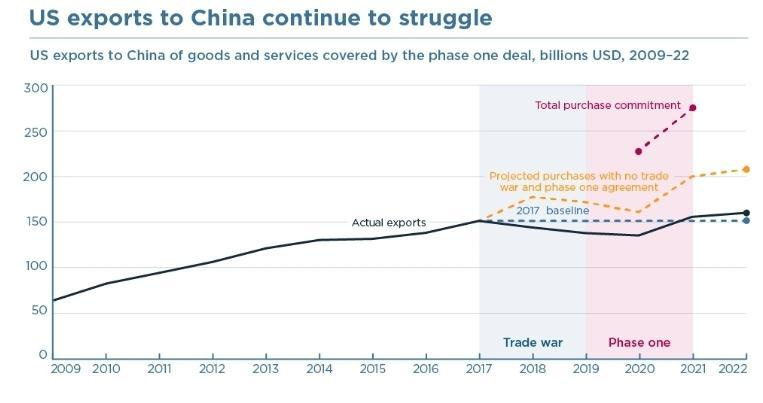The Futures - No. 11
From Quantumrun
TLDR: In this issue
The Quantumrun team shares actionable trend insights about the mad rush to monetize enterprise AI, the emerging trinity of geopolitics, technology, and economics, robots planting in the Amazon forest, and celebrities cashing in on their AI clones.

Future signals to watch
In 2023, global renewable energy capacity is expected to hit a record 440 gigawatts, about 30 percent higher than last year’s, as governments seek to lower high energy costs.
JBS announced that its subsidiary, BioTech Foods, has started constructing its first commercial-scale lab-grown meat production facility in Spain.
Cooper University Health Care has declared that it is the first hospital in the US to adopt AI-based software to identify abdominal aortic aneurysms.
The Science Based Targets for Nature (SBTN) disclosure was launched to help companies assess their impacts on nature, adding to the increasing list of ESG disclosures.
University of Cambridge researchers say that combining scalable technological and policy solutions can reduce emissions from manure and synthetic fertilizers by up to 80 percent without productivity loss.
University of Geneva and the University of Zurich researchers have successfully hatched the first genetically edited snake using the CRISPR-Cas9 gene-editing technique.
Intel's deepfake detection platform employs biometric cues to identify fraudulent videos in real-time.
Celebrities are cashing in on their AI clones. The age of synthetic media is accelerating.
Everyone wants a piece of the enterprise AI pie

With software vendors like Microsoft, Adobe, and Salesforce diving head first into the glittering mines of enterprise AI, consultancy and professional service firms have started to invest aggressively in providing AI solutions.
The past few months, in particular, have seen many similar announcements:
In April, PwC outlined plans to allocate USD $1 billion over the next three years to enhance and scale up its AI services.
In May, IBM Consulting established a Center of Excellence for generative AI to facilitate business transformation.
And in June, Accenture announced an investment of USD $3 billion over three years for its Data & AI division.
This trend reflects the growing adoption of AI in business strategies, with approximately 75 percent of companies integrating AI, according to Accenture. Notably, a third of these firms successfully have scaled AI pilot initiatives, leading to diverse outcomes, such as accelerating research and development and enhancing customer experiences.
Accenture also revealed that 42 percent of companies reported higher returns from AI initiatives than expected. In addition, a similar 2021 McKinsey report highlighted the significant impact and speed of innovation associated with these technologies, where nearly 30 percent of respondents said at least 5 percent of their earnings are attributable to AI.

Actionable trend insights as enterprise AI takes off
For entrepreneurs: Just as social media marketing agencies became all the rage during the 2010s, it is highly probable that AI consulting agencies may proliferate during the late 2020s and beyond. Helping companies of all sizes understand and adopt new AI and automation tools can help them achieve significant cost savings and potential revenue gains. Moreover, there will be a continued demand for bespoke AI solutions for different industries and Fortune 500 companies that can provide young entrepreneurs with rapid acquisition exit opportunities for their AI ventures.
For corporate innovators: Companies can use AI to enhance efficiency, drive innovation, and gain a competitive edge. They may start by identifying areas where AI can have the most impact, such as customer service or supply chain management. Then, they can develop an in-house AI team or collaborate with AI solution providers to realize automated process efficiencies. Corporations should also invest in training their employees on AI.
For public sector innovators: They can use AI to improve public sector service delivery and policy-making. Government agencies can begin by identifying key areas where AI can improve services, such as healthcare or education. They can then collaborate with AI solution providers or build in-house capabilities. They can also use AI to analyze large data sets and inform policy decisions. Implementing AI in the public sector also requires developing a regulatory framework to guide AI use and maintain ethical standards.
Trending research reports from the world wide web
A Boston Consulting Group (BCG) survey showed leaders are more optimistic about AI than frontline employees.
Approximately 75 percent of the potential benefits that could be derived from generative AI applications are concentrated within four sectors: customer operations, marketing and sales, software development, and research & development.
The Digital News Report 2023 highlights the increasing significance of video-based content (e.g., TikTok, Instagram, and YouTube) for news dissemination, particularly in regions of the Global South.
As of May 2023, DoorDash was responsible for more than 50 percent of all restaurant deliveries in the US.
Geotechnomics
The merging of geopolitics, technology, and economics (geotechnomics) is changing how countries interact and cooperate. New technologies like artificial intelligence, 5G, and quantum computing have become crucial in determining the most powerful countries. These technologies are also helping us tackle global problems like food security and climate change.
Some innovations have both business and potential military uses, which means economic and safety concerns are becoming increasingly linked. Governments worldwide are reviving industry rules to manage the trade-off between economic growth, access to technology, and national security.
For example, the Trump Administration signed a truce to the trade war with China called Phase One in 2020. However, in 2022, the Biden Administration restricted semiconductor technology exports to China in response to mounting national security concerns. This year, the US is collaborating with allies Japan and the Netherlands to further tighten these restrictions.

On the security front, it's getting harder for governments to control new technologies that could have both peaceful and harmful uses. In international relations, the competition to develop new technologies is changing the alliances between countries and corporations, requiring even countries with different values to work together. But the growing trend of countries looking inward or deglobalization is making cooperation more uncertain.
Actionable trend insights as geopolitics, technology, and economics continue to merge
For entrepreneurs: Geotechnomics provides opportunities for startups to innovate and offer solutions that meet the needs of this evolving global landscape. Since the Ukraine-Russia war, significant new opportunities for the private sector have emerged to help defense agencies modernize their military assets and capabilities. Technology sanctions represent opportunities for local companies in affected countries to develop replacement technologies with limited competition. And closer ties among different blocs of countries may open up new trade opportunities.
For corporate innovators: Companies may need to increasingly incorporate geopolitical considerations in their strategic planning and technology investments. This need may necessitate hiring professionals or consultants with Political Science backgrounds, and even developing dedicated departments to monitor political developments in regions where a given corporation has a financial interest. These geopolitical advisors can conduct geopolitical risk assessments to help businesses understand their exposure to global trends and advise on how to invest in technologies, new facilities, and public-private partnerships in different regions of the world.
For public sector innovators: Governments can use geotechnomics to strengthen policies designed to strengthen national security, economy, and international influence. For example, by developing policies that support technological innovation, policymakers can attract investments and boost the economy. They can also set up task forces to understand the impact of emerging technologies on national security and the economy. Establishing tech alliances can help them access critical materials in sustainable industries like renewable energy and electric vehicles.
Outside curiosities
Marketing professor and public speaker Scott Galloway thinks the VR headset Vision Pro will be Apple's “first major commercial failure of the century.”
ABB Robotics’ YuMi is automating planting tasks in the Amazon jungle’s laboratory, allowing rangers to do other conservation work.
In some countries, an overeducated population can become more costly than its economic returns.
Check out robots that learned to do chores from YouTube. Robots are also recreating recipes from watching cooking tutorials on YouTube. Basically, robots are also vulnerable to the YouTube rabbit hole; they are getting more human every day.
More from Quantumrun
Read more daily trend reporting on Quantumrun.com
Subscribe to the Quantumrun Trends Platform (free for premium newsletter subscribers)
Follow us on Linkedin
Follow up on Twitter
Finally, share your thoughts in the Substack comments below. We love hearing from you!
David Tal, Quantumrun President: Interested in collaborating with the Quantumrun Foresight team? Learn more about us here.
See you in The Futures,
Quantumrun


